The Waqf Amendment Bill 2024 has been referred to a Joint Committee of Parliament. The Bill seeks to amend the 1995 Waqf Act, proposing sweeping changes to how Waqfs are governed and regulated.
- This Bill met with strong criticism from the Opposition parties who said the proposed law was “unconstitutional”, “anti-minority”, and “divisive”.
About Joint Parliamentary Committee
- It is an ad-hoc Committee, established by the Parliament to conduct a thorough examination of a specific subject or Bill.
- It consists of members from both Houses as well as from the ruling and opposition parties and is chaired by a member of the Lok Sabha (appointed by Speaker of the Lok Sabha).
|
About Waqf
A Waqf is a personal property given by Muslims for a specific purpose — religious, charitable, or for private purposes.
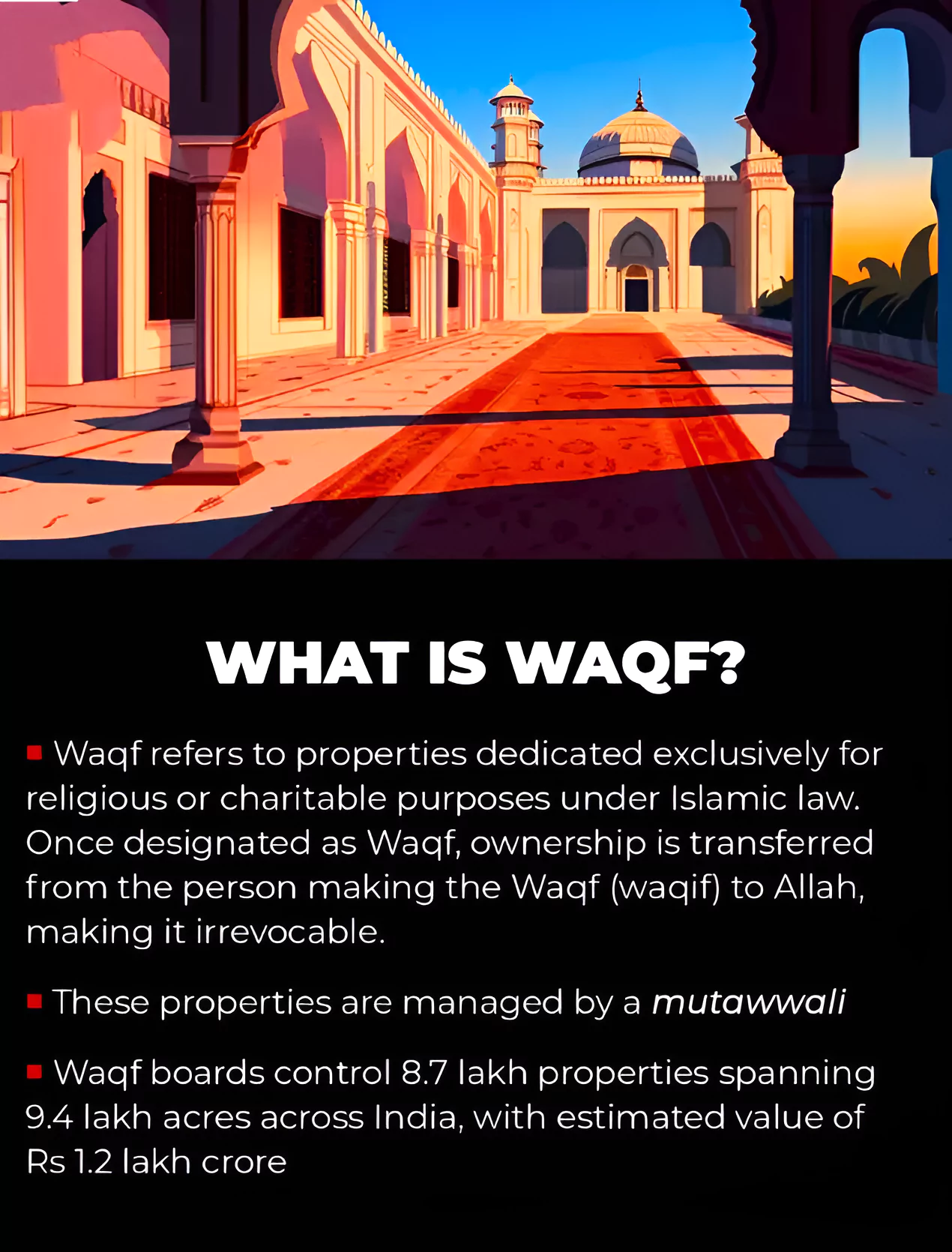
- Historical Background: The concept of Waqf (endowment) was introduced in India with the advent of Muslim rule.
- During the Mughal and Sultanate periods, Waqf management was centralised and theocratic in nature.
- The earliest recorded Waqf in India dates back to the Delhi Sultanate, when Sultan Muizuddin Sam Ghaor dedicated two villages to the Jama Masjid of Multan and entrusted its administration to Shaikhul Islam.
- Waqf was also closely linked to conversion and cultural appropriation in pre-British India.
- Formation: A Waqf can be formed through a deed or instrument or orally, or a property can be deemed to be Waqf if it has been used for religious or charitable purposes for a long period of time.
- Once a property is declared as Waqf, its character changes forever, and cannot be reversed.
- Ownership: While the beneficiaries of the property can be different, the ownership of the property is implied to be with God.
Enroll now for UPSC Online Course
Governance of Waqf in India
Waqf properties in India are governed by the Waqf Act 1995.
- Legal Backing: India has had a legal regime for the governance of Waqfs since 1913, when the Muslim Waqf Validating Act came into force.
- The Mussalman Wakf Act, 1923,and then the Central Waqf Act, 1954, was enacted, which was ultimately replaced by the Waqf Act, 1995.
- In 2013, the law was amended to prescribe imprisonment of up to two years for encroachment on Waqf property, and to explicitly prohibit the sale, gift, exchange, mortgage, or transfer of Waqf property.
- Maintenance of List: The Waqf law provides for the appointment of a survey commissioner who maintains a list of all Waqf properties by making local investigations, summoning witnesses, and requisitioning public documents.
- Managed by: A Waqf property is managed by a mutawalli (caretaker), who acts as a supervisor. Waqf properties are managed in a way that is similar to how properties under Trusts are managed under the Indian Trusts Act, 1882.
- Under Judgment of: The Waqf Act states that any dispute related to Waqf properties will be decided by a Waqf Tribunal.
- The Tribunal is constituted by the state government, and comprises three members:
- A chairperson who is a state judicial officer not below the rank of a District, Sessions or Civil Judge, Class I
- An officer from the state civil services
- A person with knowledge of Muslim law and jurisprudence
- Other Associated Organisations and Members: The law also has provisions for the constitution and appointment of Waqf Boards, Waqf Councils, Chief Executive Officers (CEOs) for Waqf Boards in the states.
- The CEOs and parliamentarians who are part of the Waqf Boards must be from the Muslim community.
About Waqf Board

A Waqf Board is a body under the state government, which works as a custodian for Waqf properties across the state.
- Coverage: In most states, there are separate Waqf Boards for the Shia and Sunni communities. Almost all prominent mosques in the country are Waqf properties and are under the Waqf Board of the state.
- Membership: A Waqf Board is headed by a chairperson, and has one or two nominees from the state government, Muslim legislators and parliamentarians, Muslim members of the state Bar Council, recognised scholars of Islamic theology, and mutawallis of Waqfs with an annual income of Rs 1 lakh and above.
- Powers: A Waqf Board has powers under the law to administer the property and take measures for the recovery of lost properties of any Waqf, and to sanction any transfer of immovable property of a Waqf by way of sale, gift, mortgage, exchange, or lease.
- However, the sanction shall not be given unless at least two thirds of the members of the Waqf Board vote in favour of such a transaction.
Key Insights on the Proposed Waqf Amendment Bill 2024
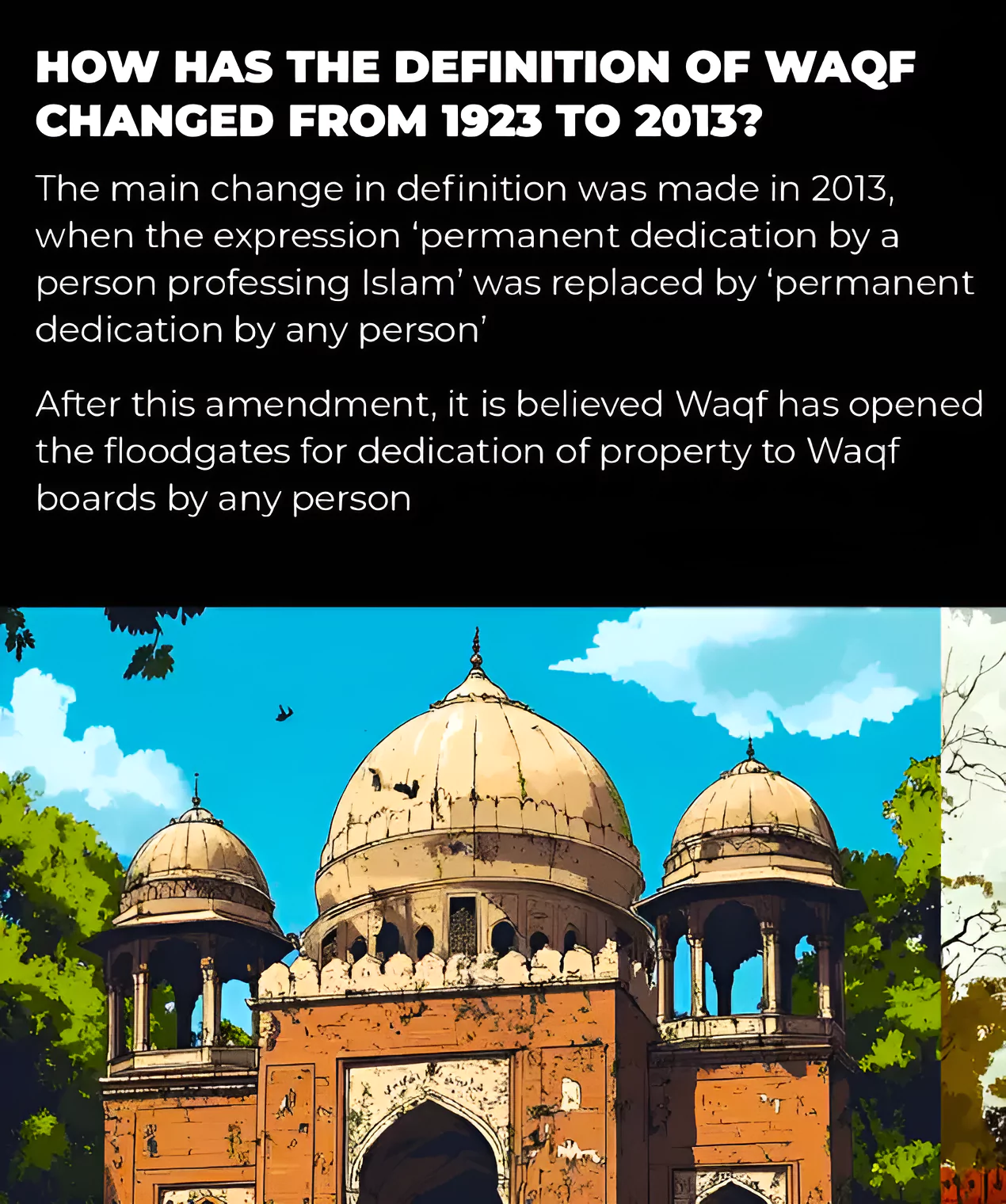
The Bill seeks to substantially alter the existing framework of Waqf law. The proposed amendment shifts the power of governing Waqfs from the Boards and Tribunals, which are largely run by the Muslim community, to the state governments.
- Change of Name: The Bill seeks to change the name of the parent Act from the Waqf Act, 1995, to the Unified Waqf Management, Empowerment, Efficiency and Development Act, 1995.
- Alteration of the Definition of ‘Waqf’: Under the Bill, only lawful property owners who have practised Islam for at least five years are authorised to create ‘waqf’ properties through the execution of formal deeds.
- This revision abolishes the ‘waqf by use’ concept, which permits a property to be considered waqf based on usage, even if the original deed was disputed.
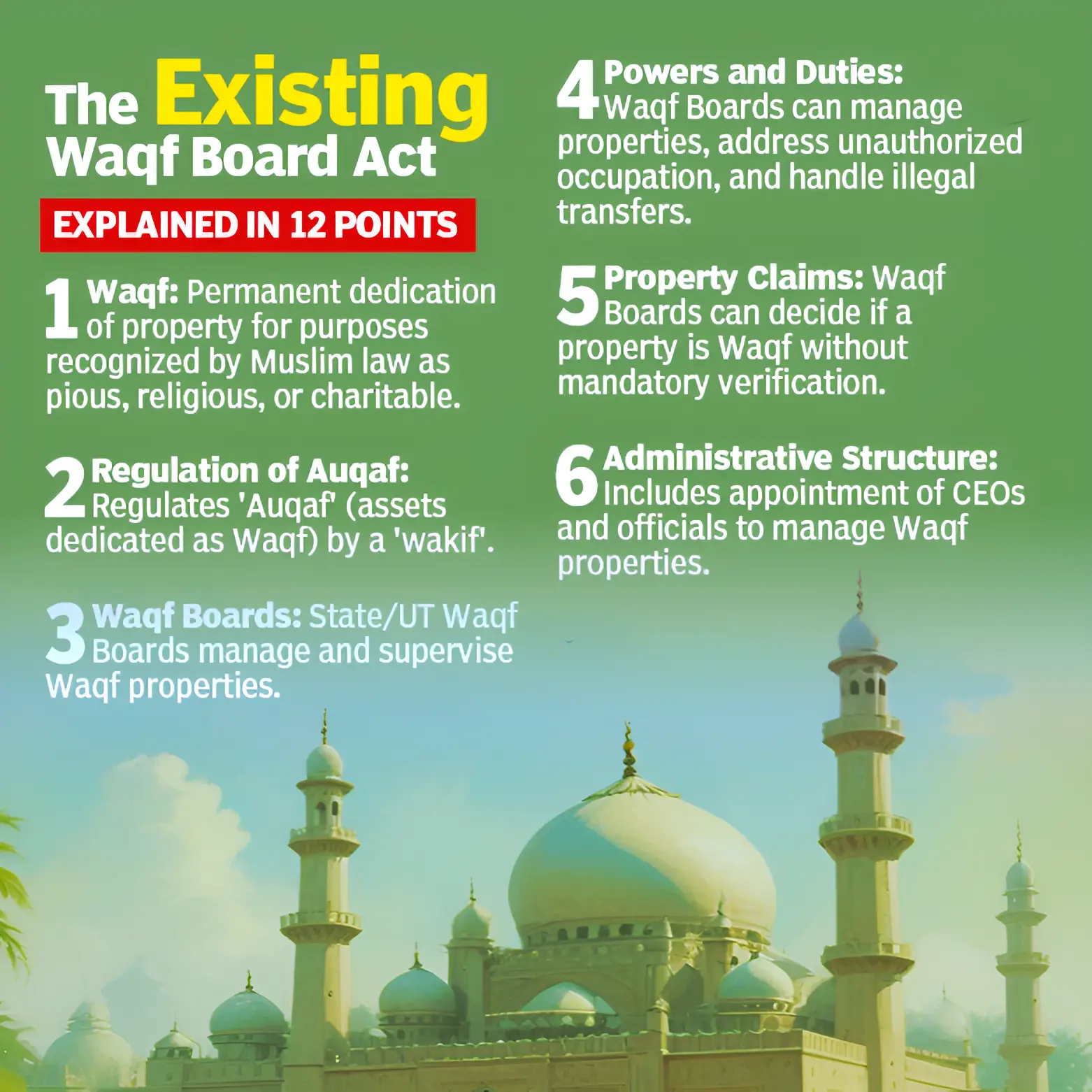 Traditionally, waqf properties were often dedicated orally until formal documentation became standard practice.
Traditionally, waqf properties were often dedicated orally until formal documentation became standard practice.
- Addition of New Provisions: It seeks to introduce three new provisions in the Act:
- Section 3A: It states that no person shall create a Waqf unless he is the lawful owner of the property and competent to transfer or dedicate such property.
- This provision appears to address the assumption that land that does not belong to an individual is not given as Waqf.
- Section 3C(1): It states that “government property identified or declared as Waqf property, before or after the commencement of this Act, shall not be deemed to be a Waqf property”.
- Section 3C(2): It empowers the government to decide if a property given as Waqf is government land.
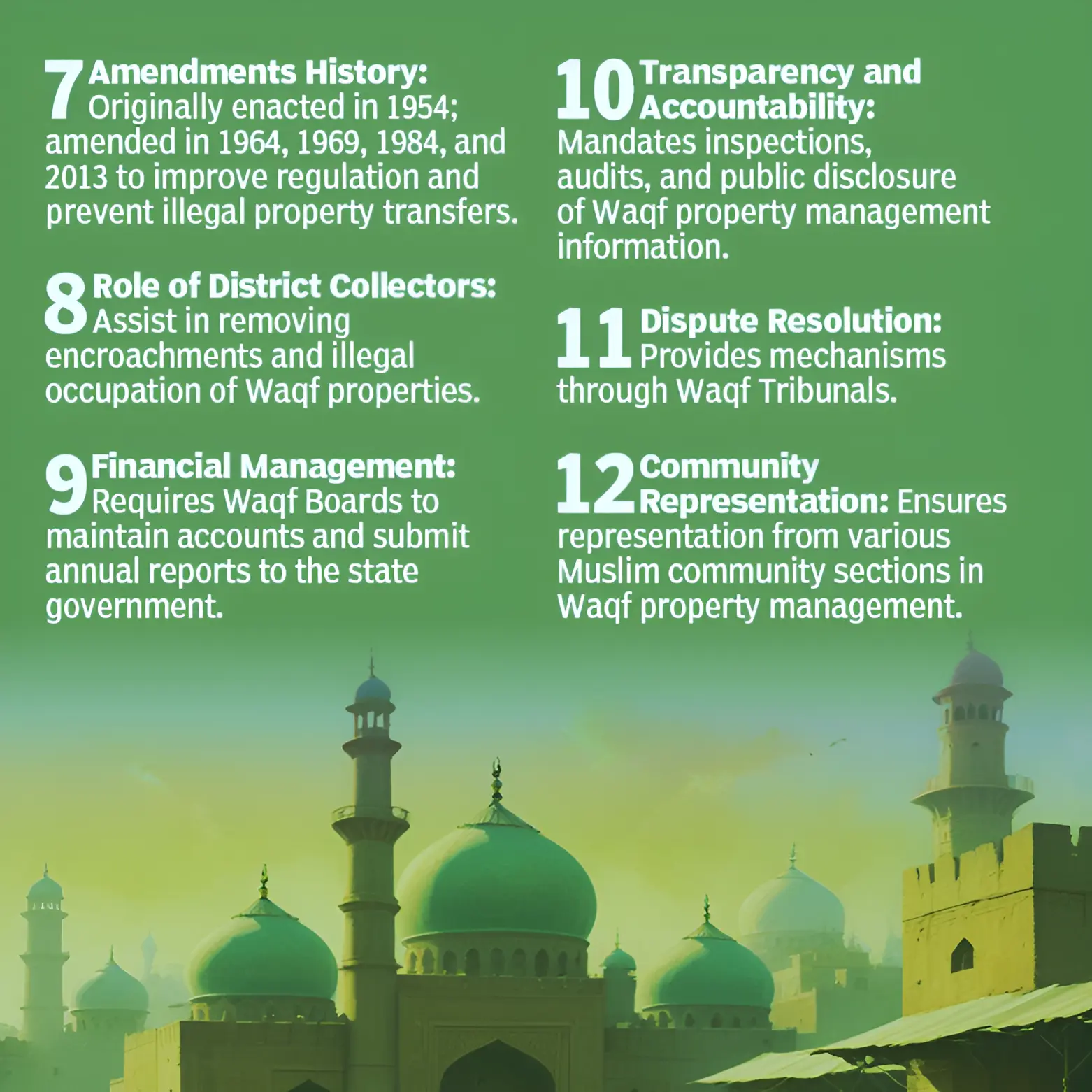 Unrecognition of Waqf Property: To prevent any fraudulent waqf claims, the Bill stipulates, “Any government property identified or declared as waqf property, before or after the commencement of this Act, shall not be recognized as waqf property.”
Unrecognition of Waqf Property: To prevent any fraudulent waqf claims, the Bill stipulates, “Any government property identified or declared as waqf property, before or after the commencement of this Act, shall not be recognized as waqf property.” -
- The proposed Bill, by omitting the provisions relating to “Waqf by user,” makes a Waqf property suspect in the absence of a valid Waqfnama.
- Broad Representation: Women’s representation has been mandated in the new Central Waqf Councils and state Waqf state boards. There will also be representation of different sections among Muslims like the Bohras and backward sections.
- The law permits widows, divorced women, and orphans to be beneficiaries of proceeds from waqf assets.
- Power Reposed in District Collectors: The responsibility of surveying waqf properties, previously managed by survey commissioners under the 1995 Act, will now be assigned to district collectors or officers of equivalent rank.
- Revenue records are with the collector, hence should decide whether a piece of land is government land or Waqf land.
- Centralised Registration System: Technology will be used for efficient functioning and all Waqf documentation will be monitored by the ministry. This system is proposed to improve the accuracy of waqf property records.
- All information about waqf properties must be uploaded to this portal within six months of the new law’s enactment.
- Moreover, any new waqf property registrations must be submitted exclusively through this portal to the Waqf Boards.
- On Determination of Property: The Bill omits section 40, which previously granted waqf tribunals the authority to determine whether a property qualifies as waqf.
- It designates the district collector as the final arbiter in such matters.
- Once a determination is made, the collector must update the revenue records and submit a report to the State government.
- The Bill makes it clear that the disputed property cannot be treated as a waqf property till the collector submits his final report. This implies that until the government decides the issue, a Waqf Board cannot be in control of the disputed land.
- Inclusion of ‘Non-Muslims’: The Bill proposed the inclusion of non-Muslims in key waqf institutions — the Central Waqf Council, State Waqf Boards, and waqf tribunals.
- Power on Appointment: It empowers the Centre to appoint three Members of Parliament (two from the Lok Sabha and one from the Rajya Sabha) to the Central Waqf Council without specifying that they have to be Muslims.
- Similarly, as per the new Bill, State Waqf Boards have to include two non-Muslims and two women as members.
- Under the 1995 Act, the three MPs to be included in the Council had to be from the Muslim community.
- Composition: It has been changed from a three-member body to a two-member body. The tribunal will now consist of a district judge and an officer of joint secretary rank to the State government.
- Time Frame on Resolution of Disputes: Under the proposed law, tribunals must resolve disputes within six months, with a possible extension of an additional six months.
- Stringent Financial Oversight: The Bill empowers the Centre to “direct the audit of any waqf at any time by an auditor appointed by the Comptroller and Auditor-General of India, or by any officer designated by the Central Government for that purpose.”
- The Waqf Boards are required to audit their accounts annually, selecting auditors from a panel constituted by the State governments.
- Penalties will also be levelled upon mutawallis (caretaker) if they fail to maintain proper accounts.
- Judicial Review: The proposed law allows courts to intervene in waqf disputes.
- It removes the finality of decisions made by waqf tribunals, allowing aggrieved parties to appeal directly to the concerned High Court.
- This is aimed at increasing judicial oversight and curbing instances of arbitrary exercise of power by Waqf Boards or tribunals.
Check Out UPSC CSE Books From PW Store
Need for the Waqf Amendment Bill 2024
The Bill is about bringing transparency in an institution, which is not a place of worship. The Waqf Board is made by law and if it starts malfunctioning, the government has the right to introduce transparency.
- Efficiency: The Sachar Committee report said that Rs 163 crore are generated as annual income of 4.9 lakh registered Waqf properties and if these are efficiently managed, Rs 12,000 crore per annum would be generated.
- Better Infrastructure: A joint committee under K Rehman Khan also said that the Waqf Board has inadequate infrastructure and manpower.
- It added that proper documentation be maintained, there be computerisation and a centralised database of the same, and the Waqf Act be relooked.
- Combat Encroachment: In the last year alone, 194 complaints were received about encroachment or illegal transfer of Waqf land and the present law for having no law of limitation.
- Better Justice Delivery: In 1976, a Waqf enquiry report recommended that proper steps be taken to simplify the tribunal system to do away with too many pending cases.
- It also said that audits and accounts of the Waqf Board were not proper and needed to be improved.
- Inclusiveness: Misuse of the ‘Waqf-al-Aulad’ provision denies inheritance rights to women and orphans in certain cases is another concern sought to be addressed by the bill.
Significance of the Waqf Amendment Bill 2024
The Waqf Board Amendment Bill 2024 will bring a lot of changes that are aiming to improve Governance in India and enhance transparency. By addressing key issues in the existing Waqf Act of 1995, the bill seeks to bring about significant administrative reforms and ensure more inclusive and efficient management of Waqf assets.
- Enhanced Transparency: The bill includes provisions to digitise records and create a centralised database. This will make it easier to track and manage Waqf properties, reducing the potential for fraud and mismanagement.
- Improved Governance: Administrative reforms proposed in the bill by the government will lead to more professional and efficient management of Waqf properties. This could result in better utilisation of these resources for charitable and religious purposes.
- Protection of Waqf Properties: The bill aims to protect Waqf properties by regulating leasing and preventing encroachments. Unauthorised use and exploitation of these properties will be prevented, ensuring they are used for their intended religious and charitable purposes.
- Inclusion and Representation: Including Muslim women and non-Muslims in Waqf Boards is a step toward more inclusive governance, ensuring diverse perspectives in decision-making.
- Efficient Dispute Resolution: The new dispute resolution mechanism will help in resolving conflicts related to Waqf properties more effectively, reducing the burden on regular courts and ensuring quicker justice.
- Amendments are not Unconstitutional: The provisions of the Bill does not take away the freedom of any religious body protected under Articles 25 to 30 as the waqf board being a religion denomination and as per the Bramchari Sidheswar Bhai & Ors.v State Of West Bengal (1995), waqf board does not fall within the purview of Articles 25 and 26.
Challenges with the Proposed Waqf Amendment Bill 2024
Following challenges has been raised by various experts:
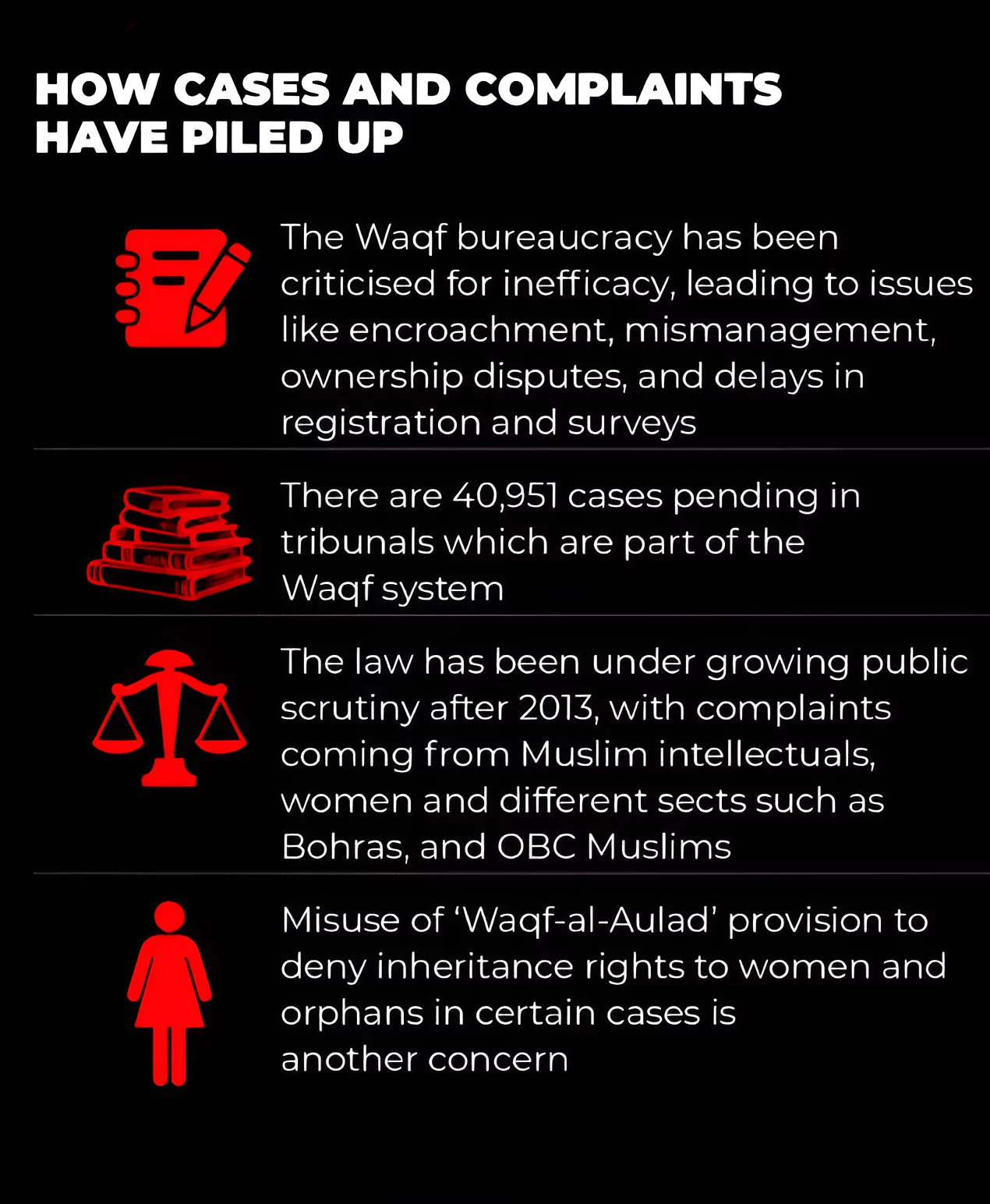
- Against Constitutional Values: Various critics argue that the provision of the Bill that non-Muslims can also be members of the governing council is against the values of Article 26 that provides freedom to manage religious affairs, subject to morality, health, and public order. It provides the right to form and maintain institutions for religious and charitable purposes.
- The Bill is violative of Article 14, which ensured equality before law, as it was discriminatory against one religion.
- It is against federalism as land is a state subject.
- In 1962, the SC ruled that the government should not interfere in religion.
- Excessive Executive Control: Excessive government control is against the principles of economic liberalisation. Rights vested in waqf properties hundreds of years ago cannot be taken over by executive officers without fair judicial determination.
- Undermining of Autonomy: The Waqf are privately acquired or inherited properties dedicated for religious purposes; interference of the government will undermine the autonomy of the waqf.
- Increased centralisation of waqf property management and the inclusion of non-Muslims in waqf governance might undermine the autonomy of Muslim religious institutions.
- Adverse Possession: Introducing the concept of adverse possession for Waqf properties raises concerns that Waqf lands could be lost due to bureaucratic decisions or misuse.
- An Action to Divide the Communities: There is a concept of Waqf by use. There are various mosques including a 200-year-old mosque near Parliament for which no one knows about their deeds. This will make the existence of every mosque difficult and can create a divide between communities and provoke violence.
Enroll now for UPSC Online Classes
Conclusion
The Waqf is a statutory body, and the amendments aim to enhance its functioning, transparency, and accountability. The passage of the bill is expected to have a profound impact on the management of Waqf properties in India, ensuring that they are used for their intended purposes and benefiting the community at large.
- While the amendments are a welcome step, it is crucial to implement measures that adequately protect waqf properties without infringing upon the freedom of religion guaranteed under Article 25 (Freedom of conscience and free profession, practice, and propagation of religion) of the Constitution.
![]() 9 Aug 2024
9 Aug 2024
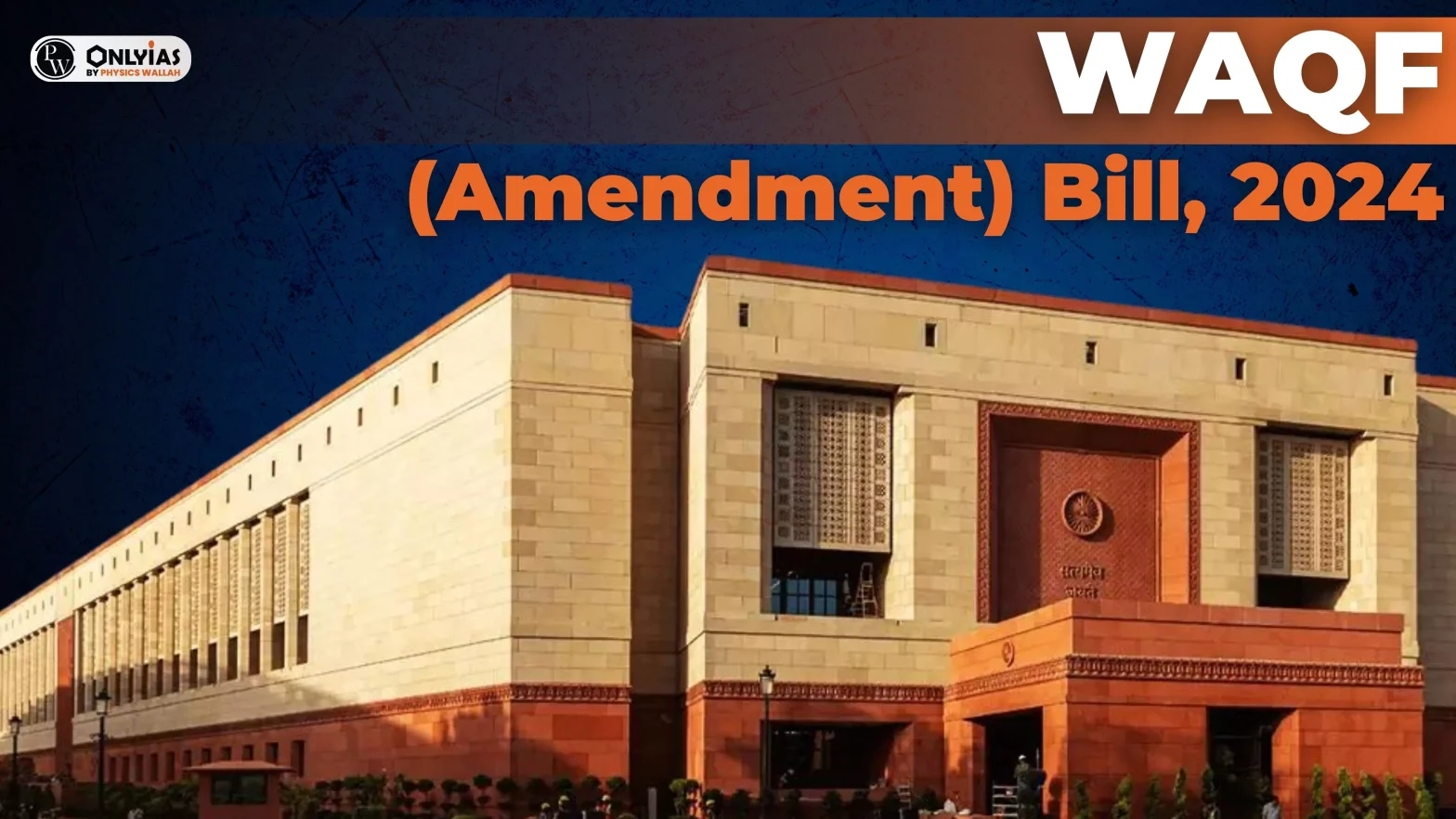



 Traditionally, waqf properties were often dedicated orally until formal documentation became standard practice.
Traditionally, waqf properties were often dedicated orally until formal documentation became standard practice. Unrecognition of Waqf Property: To prevent any fraudulent waqf claims, the Bill stipulates, “Any government property identified or declared as waqf property, before or after the commencement of this Act, shall not be recognized as waqf property.”
Unrecognition of Waqf Property: To prevent any fraudulent waqf claims, the Bill stipulates, “Any government property identified or declared as waqf property, before or after the commencement of this Act, shall not be recognized as waqf property.” 
